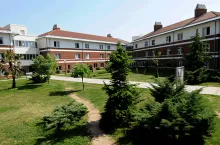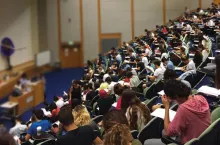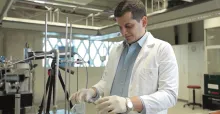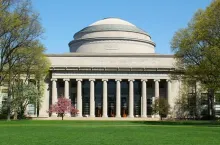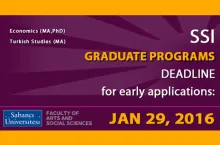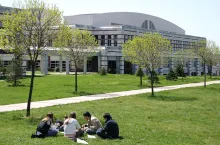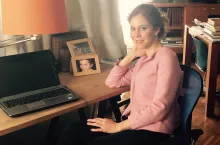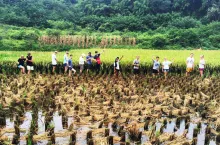Globalization means different cultures interact and communicate with each other more and more every day. Another consequence of globalization is that different cultures end up working in the same environment in multinational companies. This brings new opportunities as well as challenges to businesses. We talked with Sabancı University School of Management Professor Nakiye Boyacıgiller on the globalizing world and the importance of intercultural management in multinational companies to help guide the executives of the future.

First of all, can you tell us what intercultural management is? Why is it important?
Understanding the influence of culture on a number of issues and training employees on such potential impact is one of the requirements in business today as it is the only way to enable people from different cultures to work effectively. Cultural diversity is an asset for countries and companies alike. However, research suggests that mismanaging this asset may cause severe issues. Communication is more difficult and conflict arises. If managed consciously, this asset brings in advantages that far outweigh its challenges.
There is another detail: the term "intercultural" is not limited to national or ethnic culture. The cultures of people from different disciplines can also be different. An example is the difference between the disciplines of an engineer and a marketer. When these differences are not managed well, it makes for a difficult work environment. Another significant example of intercultural differences arises between men and women.
Intercultural management and global mindset
Does intercultural management affect an individual's achievement in work? If so, how?
Intercultural management is of course critical to an individual's achievement. While you may not be working in or own a multinational company, it is highly probable that your suppliers, customers and other parties will be coming from different cultures. Global mindset is a concept that gains weight when you want to work better and more effectively with people from different cultures.
Does intercultural management influence the emergence of a common language and culture in multinational companies? If so, how does it bring about this change?
I'd like to emphasize global mindset once more. Creating a common language is always hard. It can only be done if you are receptive to new cultures. This is where intercultural management and global mindset come into play. As Muhtar Kent says, "We don't have to know each and every aspect of the business we do, but we have to know the markets and the people we work with."
Leaders share an ability of viewing the world from different perspectives. If you are an international company, you may have Latin American or African employees. If you manage the company from one perspective only, you will not be able to build good teams or create a common language. This is where intercultural management comes into its own. Companies that are managed by individuals who embrace new cultures and approach issues from different angles show successful intercultural management and can create a common language.
As a woman executive yourself, what is your opinion on the position of women in intercultural management based on your experiences?
We don't have sound academic findings on the leadership and management styles of women. A woman's place was her home for a very long time. While we don't have sound findings about women's leadership and business management, we do know that many cultures encourage their daughters to be polite and listen to what is being said. Listening and empathizing are crucial in today's world. And these are the messages we give our daughters. My personal experience suggests that women are better in intercultural environments.
How well do the MBA and Executive MBA programs equip participants with intercultural management skills?
At Sabancı University, intercultural management is important to us. We believe that executives and future executives must have international experience. This is how the global mindset develops.
The Sabancı University School of Management sends its EMBA participants on a two-week exchange program with the MIT Sloan School of Management, one of the world's leading business schools. Our students attend an intensive course on Leadership and Innovation. They have the opportunity to sit in lectures with the best faculty members of the MIT Sloan School of Management.
Sabancı University also leads a program called EMBA Consortium for Global Business Innovation of which I am the implementer. This is a joint program with nine universities in eight countries. Classes are comprised of participants from these countries. This allows everyone to gain some knowledge of the other culture.
As for our MBA Program, we make sure that there are foreign students in the class. This year, our MBA class has almost 30 foreign students. Since many courses are project-based, our students prepare their projects in teams. Project teams confront them with the challenges of being from a different culture, and they learn to overcome them. This develops their intercultural management skills and global mindset. Regardless of how much I lecture them on intercultural management, it is best learned when we provide a multicultural environment and they get to experience it themselves.
"Turkey cannot tap into its woman-resources... Women must invest in themselves."
What is your view on the participation of women in the workforce? Do you think women have obstacles on their path to reaching executive management? How can these be overcome?
Turkey is the land of contradiction on this subject. On the one hand, the proportion of women in some sectors such as banking and higher education is impressive, while the proportion of women in the general workforce is only around 30%. European countries have almost twice that rate. In other words, we cannot tap into our woman-resources. This is a luxury that a developing country can ill afford. Women must be able to be a part of professional life if we are to achieve our economic objectives. This calls for a mobilization in education. Better education comes with better participation in the workforce. Many individuals and institutions have responsibility in this matter, with the government being the most responsible. The government must impose some rules. Maternity leaves must be more flexible and workplaces must offer daycare facilities. The representation of women in school textbooks must change.
But I think the most hindering obstacle of them all comes from our own families. Many girls are imparted the notion that they will only be a wife and mother when they grow up. The obstacle is in the minds of girls; our textbooks, families and politicians reinforce the message. I was fortunate because when I was a child, I was asked what I would be when I grew up, much like my late brother was. This was a strong message that I was expected to grow up and have a job.
Raising children is perceived as a prohibitive obstacle for women. However, recent studies show that when men do their part in housework and raising a child, the couple has a happier marriage and children grow up to be more healthy.
You must have heard what the Canadian prime minister said when asked why 50% of his cabinet were women: "Because it's 2015." I believe that, in a similar fashion, companies with less than 50% in upper management must take immediate action to change this.
Women also have responsibilities in being a part of the workforce. I don't think the EMBA class has enough women participants. As the EMBA Director, my personal objective is to increase the proportion of women. We will ask companies for more support in this. Women should also invest in themselves. In the information society that we live in today, acquiring knowledge and building a network are key. Attending the EMBA program provides these, while giving their superiors the message that they want to advance in their careers and achieve higher positions.
About Professor Nakiye Boyacıgiller
Professor Nakiye Boyacıgiller is an expert on international management and the former dean of the Sabancı University School of Management.
Professor Nakiye Boyacıgiller was educated in Turkey, United States and France. Boyacıgiller has an undergraduate degree from Boğaziçi University and received her graduate degree from the Anderson School at the University of California. She then completed her PhD at the Haas School of Business, University of California, Berkeley. Prior to joining Sabancı University, Boyacıgiller worked in the San Jose State University and gave lectures at the Anderson School at UCLA, the Haas School of Business, University of California, Berkeley, the Stockholm School of Economics, Bilkent University, and Boğaziçi University for 17 years.
Award-winning Professor Nakiye Boyacıgiller’s areas of interest include intercultural management and organizational behavior. Her seminar on the cultural content of Turkish organizations received critical acclaim from academia as well as business circles. Professor Boyacıgiller was chosen to the membership of the Academy of International Business (AIB) in 2007.
Professor Nakiye Boyacıgiller has held leadership positions in business and academic institutions including AIB Chair (2014 – 2015) and Head of International Management at the Academy of Management (1996-1997). She was a member of the Council of Directors and the European Steering Board of the AACSB (The Association to Advance Collegiate Schools of Business) (2012-2014). She served on the steering boards of the Vienna University of Economics and Business, Bologna Business School, Cyprus International Institute of Management, KAGIDER (Women Entrepreneurs Association of Turkey), Istanbul Policy Center, Turkish Philantrophy Foundation, and Change Leaders Association.
During Professor Nakiye Boyacıgiller’s tenure as the Dean of the Sabancı University School of Management, the number of faculty members increased, new programs were initiated, student numbers increased by tenfold, AACSB Accreditation was acquired and a strategic cooperation agreement was signed with the MIT Sloan School of Management.
Boyacıgiller is currently teaching courses in the Sabancı University School of Management and is the director of the Executive MBA Program.
Interview: Mariam Öcal

